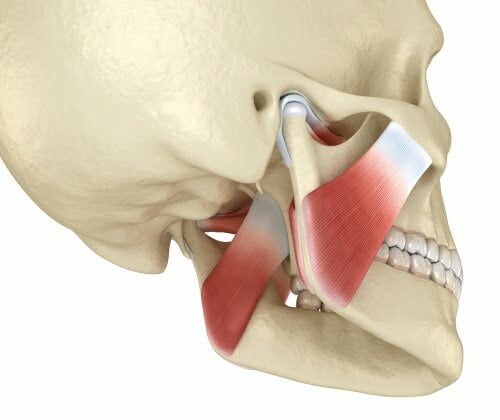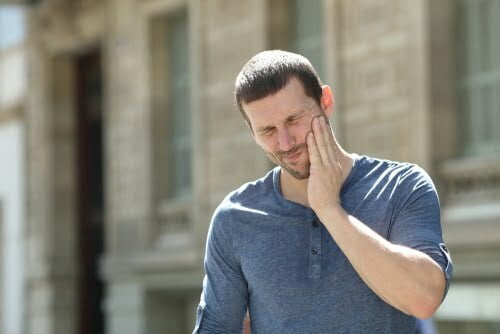
The temporomandibular joint, also known as TMJ, refers to the two joints that connect your jaw bone or mandible to the skull. These joints make the ability to move your TMJ, chew, and speak, without any jaw pain or restrictions. However, if you experience any problems with your TMJ, it can lead to severe pain known as TMJ dysfunction (TMD). TMJ dysfunction can be an extremely painful condition that might prove difficult to resolve without the correct treatment plan.
This condition may be intra-articular or extra-articular. Intra-articular TMJ dysfunction can involve inflammation, changes in the internal structure, or degeneration. Extra-articular can involve an imbalance of or overactive jaw muscles. Usually, the masticatory muscles and cervical muscles are involved because of the correlation between postural dysfunction of the cervical spine and TMJ dysfunction. However, other conditions can cause pain in the temporomandibular joint. A patient will need a proper diagnosis to ensure that the right treatment is prescribed.
TMJ pain may also linger in the:
Jaw joints
Face
Head
Neck
Ears
What Are the Causes?
Intra-Articular
- Trauma: This can include direct trauma, such as being hit in the jaw, chin, or face, and indirect trauma, such as teeth grinding, jaw clenching, worn down teeth, or whiplash injuries. Trauma can lead to stiffness or inflammation in one or both temporomandibular joints and cause wear and tear to the joint structures.
- Grinding: Most people grind their teeth or clench their jaws while asleep. This can affect your TMJ and lead to a joint or disc displacement.
- Eating: Patients often injure their TMJ from doing nothing more than eating. Biting or chewing large and thick pieces of food can result in an injury to your joint, especially when chewing on one side of your mouth.
- Arthritis: Degenerative arthritis can cause TMJ dysfunction in patients over 50 years old and affect both the joints or cause a disc injury.
Extra-Articular
- Muscle Spasms: Patients may experience muscle spasms that limit the movement of the jaw and cause a significant amount of pain. Spasms can affect more than one muscle, usually affecting the muscles of mastication. Some causes can include prolonged periods of holding your mouth open, like at the dentist, stress, or postural dysfunction.
- Posture: Many of the muscles associated with controlling the TMJ also attach to the upper neck. Patients may start to experience TMJ dysfunction if they have a “forward head posture”, which can add pressure on the mandible and cause pain.
- Fractures/Dislocations: A fracture or dislocation to the jaw can cause further TMJ dysfunction symptoms and may require treatment as soon as possible.
Symptoms of TMJ Dysfunction
Patients may experience either mild or severe symptoms with temporomandibular disorders. It can create difficulty chewing food, talking, yawning, or other mouth movements.
Some symptoms of TMJ dysfunction include:
- Pain in the temporomandibular joints, just in front of your ear hole
- Jaw pain that spreads throughout the face, behind the eyes, shoulder, neck, and sometimes the back
- Earaches
- Painful popping or clicking
- Locking of the jaw
- Jaw stiffness
- Tooth sensitivity
- Muscle spasms
- Headaches
- Nausea or dizziness
- A change in the way the upper and lower teeth are positioned
These symptoms are often associated with many other conditions and disorders, which can make them difficult to pinpoint. It’s important to see a Physiotherapist and receive an assessment, diagnosis, and treatment.

What Are the Causes?
Intra-Articular
- Trauma: This can include direct trauma, such as being hit in the jaw, chin, or face, and indirect trauma, such as teeth grinding, jaw clenching, worn down teeth, or whiplash injuries. Trauma can lead to stiffness or inflammation in one or both temporomandibular joints and cause wear and tear to the joint structures.
- Grinding: Most people grind their teeth or clench their jaws while asleep. This can affect your TMJ and lead to a joint or disc displacement.
- Eating: Patients often injure their TMJ from doing nothing more than eating. Biting or chewing large and thick pieces of food can result in an injury to your joint, especially when chewing on one side of your mouth.
- Arthritis: Degenerative arthritis can cause TMJ dysfunction in patients over 50 years old and affect both the joints or cause a disc injury.
Extra-Articular
- Muscle Spasms: Patients may experience muscle spasms that limit the movement of the jaw and cause a significant amount of pain. Spasms can affect more than one muscle, usually affecting the muscles of mastication. Some causes can include prolonged periods of holding your mouth open, like at the dentist, stress, or postural dysfunction.
- Posture: Many of the muscles associated with controlling the TMJ also attach to the upper neck. Patients may start to experience TMJ dysfunction if they have a “forward head posture”, which can add pressure on the mandible and cause pain.
- Fractures/Dislocations: A fracture or dislocation to the jaw can cause further TMJ dysfunction symptoms and may require treatment as soon as possible.
Symptoms of TMJ Dysfunction
Patients may experience either mild or severe symptoms with temporomandibular disorders. It can create difficulty chewing food, talking, yawning, or other mouth movements.
Some symptoms of TMJ dysfunction include:
- Pain in the temporomandibular joints, just in front of your ear hole
- Jaw pain that spreads throughout the face, behind the eyes, shoulder, neck, and sometimes the back
- Earaches
- Painful popping or clicking
- Locking of the jaw
- Jaw stiffness
- Tooth sensitivity
- Muscle spasms
- Headaches
- Nausea or dizziness
- A change in the way the upper and lower teeth are positioned
These symptoms are often associated with many other conditions and disorders, which can make them difficult to pinpoint. It’s important to see a Physiotherapist and receive an assessment, diagnosis, and treatment.
Treatment Options
A treatment plan can depend on some of the following factors:
- Your age
- Your health and medical history
- How long you’ve had the specific condition
- How you can handle specific medicines, procedures, and therapies
There are different treatment methods available, but Physiotherapy treatment has many benefits to help with TMJ dysfunction.
Physiotherapy
A Physiotherapist will assess your particular TMJ dysfunction to ensure the treatment plan they prescribe will match your symptoms.
Physiotherapy can eliminate TMJ dysfunction and relieve pain with the following methods:
- Reduce Muscle Spasms: Physiotherapists understand how to properly assess the temporomandibular joint. A spasm can create muscle tension and stiffness, which may impair mobility. Manual therapy techniques can reduce muscle spasms and improve both jaw alignment and movement, which promotes pain relief.
- Improve Mobility: TMJ joints can become stiff, resulting from a previous accident or injury to the jaw. With manual therapy, a Physiotherapist can use the proper techniques to loosen your joints up. This will involve stretches that will assist in the return of your range of motion.
- Joint Strengthening: For some patients, their TMJ may be moving in a poor pattern, leading to pain and discomfort. Treatments and exercises that strengthen the weaker muscles in the jaw may be prescribed to improve its movement pattern.
- Postural Training: A forward head posture can increase the chances of experiencing symptoms related to TMJ dysfunction. Physiotherapy will show a patient how to strengthen their postural muscles and lengthen shortened tissues to provide better head positioning. Patients may also receive suggestions for improving their workstation setup if they’re sitting for long periods throughout the day.
When a patient is in a lot of jaw pain and needs some relief, Physiotherapy treatments may also include acupuncture, manual therapy, and thermal modalities for the most positive outcome.
TMJ dysfunction can hinder jaw movement, such as when you chew, talk, yawn, etc. You don’t need to deal with a temporomandibular joint disorder alone. At our clinic, we’ll provide the correct treatment methods and services required to ease your mouth and jaw pain. Make an appointment at one of our Winnipeg physiotherapy clinics today and begin working toward relieving your jaw joint and muscle pain.



